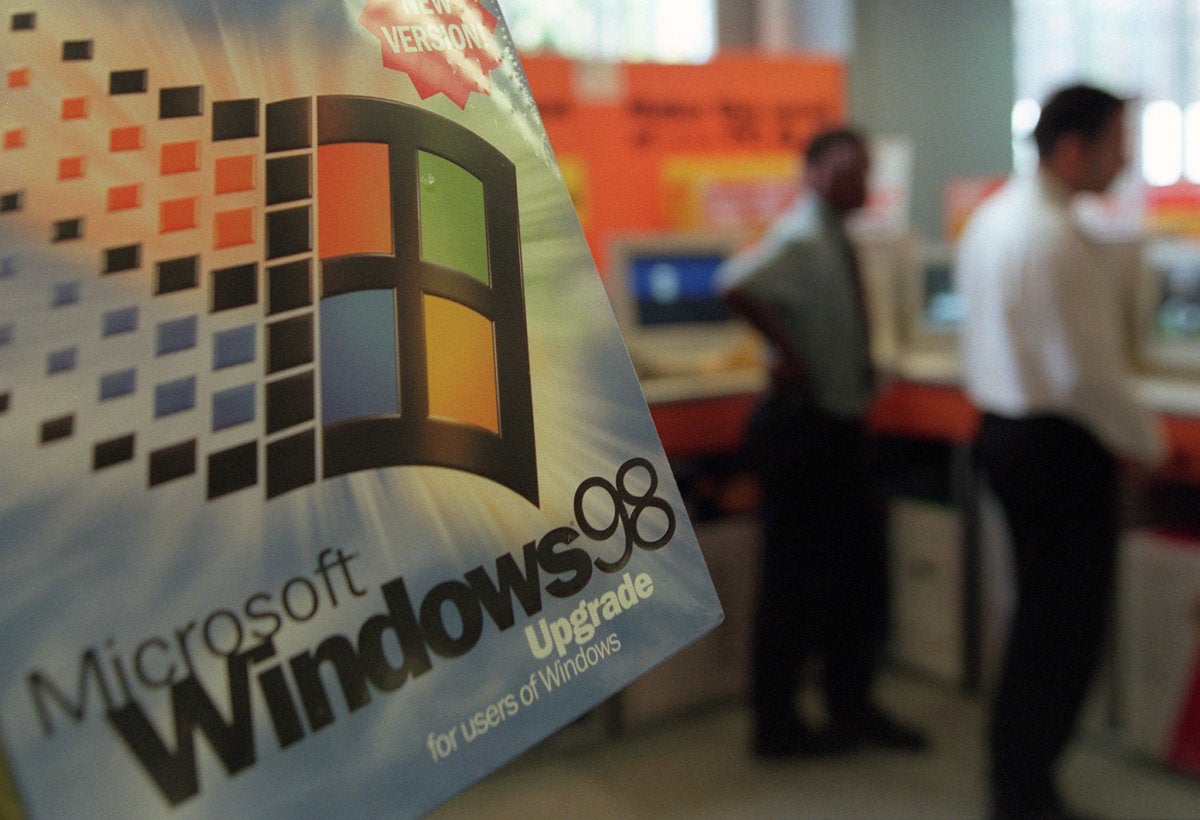It’s been 20 years since the U.S. Department of Justice and 20 state attorneys general sued Microsoft for violating federal antitrust laws. The government argued that Microsoft illegally protected its Windows monopoly and used it to try to kill competitors to Internet Explorer, notably Netscape. The suit also charged that the company used its operating system muscle to target Apple, Lotus Software, RealNetworks, Linux and others.
In late 1999, Judge Thomas Penfield Jackson ruled against Microsoft. A lot has changed since then, but how much of that change is due to that landmark ruling?
Before the suit, Microsoft was the world’s most influential technology company, with Windows essentially a monopoly in operating systems, Microsoft Office a monopoly in productivity suites and Internet Explorer a top browser.
Today, of course, the tech world is a very different place, with Google, Facebook and others wielding more power than Microsoft, with Windows overshadowed by mobile operating systems and with Microsoft’s browsers mere also-rans. In a recent op ed piece in The New York Times, Richard Blumenthal, now a senator from Connecticut, but back in the late ’90s the state’s attorney general and thus part of the suit, and Tim Wu, a law professor at Columbia, argue that the growth and innovation of the internet since then was a direct result of that suit. Without the suit, they say, the internet would be a far less innovative place. They claim, “Microsoft would have controlled the future of the web.” Google, they say, likely would have been killed in its infancy by Microsoft, and we would all be using Bing today. They also write, “Microsoft-Myspace might have become the default social network instead of Facebook.” They even argue that Netflix and other streaming media services might not have ever come to exist.
It all sounds very compelling. But is it true?
It’s not. Although the government was right to go after Microsoft for its anticompetitive actions, the state of the internet wouldn’t be all that different than it is today if Microsoft had won the case.
To understand why, take a look at the core of the suit. Microsoft argued that Internet Explorer was an integral part of Windows, that its code was required for Windows to operate properly, and that unbundling it from Windows and allowing people to easily use other browsers would significantly harm the operating system. It was a ludicrous argument, and the court rightly ruled against Microsoft. It forced Microsoft to let people easily use other browsers than Internet Explorer.
Allowing people to choose their own browsers, though, had nothing to do with Google’s success. When Google first launched, in 1998, Internet Explorer had a 45% share of the browser market, which rose to 75% the following year, and reached 94%, its peak, by 2002. During those years, as Internet Explorer increasingly dominated the market, Google took off like a rocket, so Microsoft’s browser success did nothing to impede Google. Chrome, which is now the dominant browser, didn’t exist yet. Google succeeded for a simple reason: It was the best search engine in the world. No matter which browser you used, you used Google to search because it was far better than the competition. People avoided Microsoft’s MSN search like the plague because it was such a bad search tool. Bing wasn’t even introduced until 2009.
As for Facebook, the claim that “Microsoft-Myspace” would be the world’s most popular social network if Microsoft had won the suit is just plain weird. Microsoft never owned Myspace. Facebook was launched in 2004, at a time when Internet Explorer’s share of the browser market was a stratospheric 91%, and that did nothing to hold back Facebook. Rupert Murdoch’s News Corp. bought Myspace in 2005, and the upstart Facebook beat Myspace and the global might of News Corp. because it was a far better social network.
There’s another oddball claim that Blumenthal and Wu make, that Netflix might not exist if Microsoft had won the antitrust suit. Netflix began in 1998 as a DVD rental service, and its competition was Blockbuster, not Microsoft. It wasn’t until 2007 that it launched its streaming feature — and Microsoft wasn’t in the business of streaming.
A common thread runs through the Google-Facebook-Netflix successes. They became what they are because they’re all better at what they do than anyone else. And they did it during the years when Internet Explorer had a monopoly or near-monopoly on the browser market. That did nothing to stop their dramatic growth.
The same holds true for the success of the iPhone and Android. Microsoft had a mobile operating system before Apple and Google, but it was pitifully bad. Microsoft’s attempts to make it in the mobile market have been dismal failures despite the billions of dollars spent. But that has nothing to do with the company being forced to unbundle its browser from Windows. It’s because the company never really understood what people wanted in mobile phones.
So, although Microsoft was a powerful company back in the late 1980s and 1990s, the internet was far more powerful. And the internet would have remained far more powerful even if Microsoft had won the suit and Internet Explorer retained top market share.
What would the tech world look like today if Microsoft had won the antitrust suit? Not much different than it is. Google, Facebook, Netflix and Amazon would still rule the Internet. Windows’ hold on the operating system market would still have plummeted, taking a back seat to mobile OSes. It’s possible that Internet Explorer or its successor, Edge, would now be the world’s most popular browser, which would certainly be a bad thing. But the internet as we know it would largely be the same. It remains more powerful than any one company, even one as dominant as Microsoft was 20 years ago. And it will stay that way.






